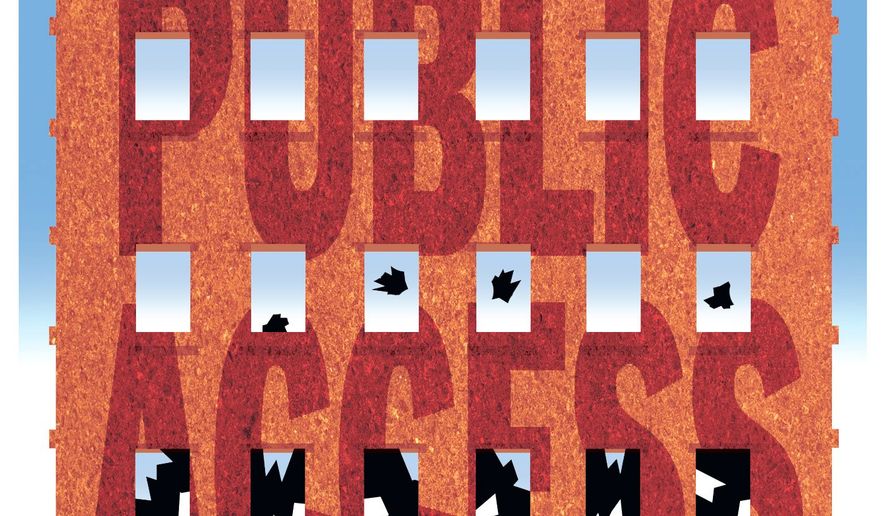OPINION:
Overlooked perhaps in the cultural shift that we have been observing in recent months is the continuing decline of public access to the public’s officials — and, for that matter, to public spaces. The perpetrators of civil disorder are doing that to us.
President Trump was criticized for saying that synagogues should hire armed guards, but the largely unreported reality is that many already are guarded. So are some churches and other public venues that are being forced to reassess their safety. The supermarket that just opened in my Seattle neighborhood, I notice, has guards at every entrance. So do numerous stores, offices and other enterprises that once afforded easy, relaxed access.
The Department of Labor says that there now are more security guards than police officers employed in America (1.1 million vs. 660,000). The trend is nowhere more evident than in government buildings, especially where elected officials are located. To bar cranks and crazies, ordinary citizens routinely are blocked, too.
Rates for serious crimes are low, but small infractions and threats are very possibly rising and yet disregarded in our hyper-politicized age. Is it possible that the loss of people’s sense of safety — that leads to the need for more security — is due to lax enforcement of violations of the peace? Are police and prosecutors and the FBI failing to follow up evidence of credible physical threats? What has happened to the preventive role of law enforcement?
Whatever the explanation, fanatics and organized disrupters are robbing Americans of the freedom of access Americans historically enjoyed. Think about changes to the accessibility of elected officials. In his prologue to “The Rise of Theodore Roosevelt,” Edmund Morris describes a 1907 New Year’s Day reception where the president threw open the doors of the White House to anyone who wanted to show up.
“TR” shook 8,150 hands that day. Such a scene is hard to imagine at the White House — and other government buildings — now, as restrictions on public access increase with each new administration.
The rowdy crowds that got into the U.S. Capitol and into the faces of senators during the Kavanaugh confirmation hearings exposed some of the perhaps-erroneous assumptions that, by tradition, have permitted a relatively free interplay of congressmen and constituents.
All it took to prevent members from using “Members Only” elevators, for example, were some protesters prepared to put their bodies in the senators’ paths. To get past demonstrators and into their offices senators had to engage the assistance of several aides.
Concern for security long ago expanded from official Washington to offices of media, trade associations and other potential targets in the capital. From there it radiated to big cities across the country. Disrupters are getting better funded and more brazen. There are companies that advertise, like one in Beverly Hills, “Crowds for Hire.”
We have some 500,000 elected officials in America, and not all of them are worried about safety, of course. The town clerk in some rustic burg is probably just as approachable as ever. But there is discussion among prominent politicians — and among campaign managers — about when and how to take security precautions.
The intolerance that leads to violence in some college campuses has extended, for example, to “town hall” meetings and “district days” called by members of Congress. As a result, there were fewer than usual town halls offered in the session now ending.
A handful of top leaders in Congress has been assigned armed protective officers for several years now. One such security unit rescued Rep. Steve Scalise, Louisiana Republican, last year and saved other Republican House Members who were attacked by a shooter who had tracked them down at a baseball practice. Ordinary House and Senate members do not get regular protection, but some localities, even in rural areas, are providing it when the members of Congress are in their home states.
Politicians do not want to talk on the record about the security problem. For one thing, they don’t want to call attention to their vulnerability. Also, they know the citizens’ right to petition the government is sacred in our system. Beyond that, a good politician strongly desires opportunities for live meetings, to hear questions directly from constituents and to provide answers.
Politicians also are wary of punishing people — and thereby give them publicity — if they disrupt a meeting. Further, some police, made fearful of lawsuits, are slow to make arrests. Government agencies in many locales seem to think that the civil liberties of a crazed person are more important to protect than the safety of the public — or even, of the crazed person himself. Prosecutors and courts, for their part, often dismiss disorderly conduct citations once a point of immediate danger is past.
An attitude of leniency, however, can be exploited by disrupters who study exactly how far they can trespass. The same goes for threats of violence recklessly made on social media. Failure to intercede is an invitation to push further.
Perhaps it is time for public officials and police agencies to reconsider how seriously they pursue cranks and physical disrupters. As with the “broken windows” theory of combatting crime, which holds that quick police response to small incidents helps prevent more serious ones, there comes a point where you need to enforce the existing laws on public decorum.
You need to provide some instructive fines and jail time for those who attempt mob action. You also need to follow up vigorously any leads on possibly deranged individuals given to physical threats online or in person.
Otherwise, our access to public spaces and public officials will continue to erode, along with freedoms we too long have taken for granted.
• Bruce Chapman founded Discovery Institute and is the author of “Politicians: The Worst Kind of People to Run the Government, Except for All the Others” (2018).




Please read our comment policy before commenting.